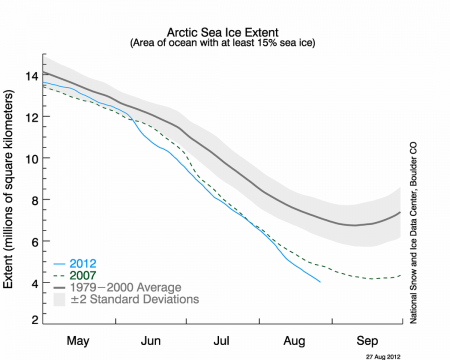An interesting report released by Leonardo Maugeri (PDF) at Harvard’s Belfer Center argues that the world still has huge amounts of unconventional oil and that recent concerns about ‘peak oil’ are ill-founded:
“My field-by-field analysis suggests that worldwide, an additional unrestricted supply of slightly less than 50 mbd is under development or will be developed by 2020. Eleven countries show a potential outflow of new production of about 40.5 mbd, or about 80 percent of the total. After adjusting the world’s additional unrestricted production for taking into account risk-factors, the additional adjusted supply comes to 28.6 mbd , or 22.5 mbd for the first eleven countries – as shown in Figure 3 (more extensive data are shown in Table 3, Section 4).
These numbers carry at least two important messages:
* They represent the largest potential addition to the world’s oil supply capacity since the 1980s.
* They point to a tectonic shift in the oil geography and geopolitics, by making the Western Hemisphere the fastest growing oil-producing region in the world, with the United States and Canada combined outpacing any other country.
This suggests that the hopes of some environmentalists that there might not be enough oil available to cause catastrophic or runaway climate change may not be realized. Of course, even if oil were scarce, there is a lot of planet-altering gas and coal left in the world.
Maugeri concludes that in the medium term, substantially more oil production is possible:
“In any case, the single most important issue that emerges from my analysis is that, from a purely physical and technical point of view, oil supply and capacity are not in any danger. On the contrary, they could significantly exceed world consumption needs and even lead to a phase of oil overproduction if oil demand does not exceed a compounded rate of growth of 1.6 percent each year to 2020.”
He identifies Iraq, the United States, and Canada as the countries most capable of increasing their oil output during that timespan.
Maugeri also highlights the long investment lag-times and asymmetries that exist in the fossil fuel sector:
“The industry tends to increase investment gradually as the price of crude oil increases, but once the new investments are started, they are very difficult to stop, even when consumption and crude oil prices suddenly collapse. In other words, the industry behaves like an elephant running: it starts very slowly, but once it gets going, no one can stop it.
In fact, as an oil company gradually spends its budget, the investment assumes a life of its own, and it becomes unprofitable to block the spending, especially when hundreds of millions of dollars have already been spent. The need to obtain an economic return on capital already invested takes priority over almost any other consideration, unless there are dramatic changes in the market situation.
To complicate matters, contractual commitments are made by the oil companies with the countries owning the deposits, which often make it difficult to block or reduce the spending. Indeed, these commitments demand heavy economic penalties or even revocation of the concessions granted by the host government if, by pre-established dates, the agreed number of wells and the needed infrastructure are not realized, and initial production is not achieved.”
Once companies make the gigantic investments necessary to access these unconventional oil reserves, it is unreasonable to think that they will be willing to stop exploiting them in the future, or that politicians will be willing to force them to accept such losses. Arguably, the only way to stop an unconventional fossil fuel bonanza that wrecks the climate is to keep it from ever starting.
George Monbiot has also written a column about Maugeri’s report.
